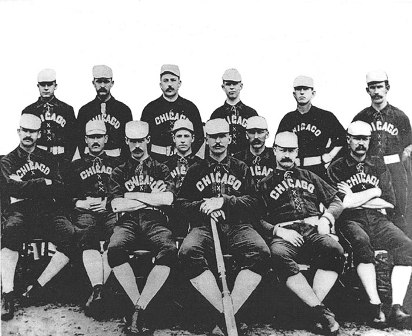Emil Michael “Em” Gross was one of the best hitting (.295) and worst fielding (233 errors) catchers of the 19th Century during five major league seasons between 1879 and 1884. The Chicago Tribune’s Hugh Fullerton, no stranger to hyperbole, called Gross “perhaps the heaviest hitting catcher that ever donned a glove.”
Gross, a Chicago native, didn’t need baseball in order to earn a living. In 1884, when he played with his hometown team, the Browns, in the Union Association (the team relocated to Pittsburgh in August), The Chicago Daily News said he “owns $50,000 worth of real estate in Chicago.”
Gross’ professional career came to an end after the 1884 season, but he played one more year for a Chicago semi-pro team called the Heavyweights. The Tribune said of the team:
“While they do not count a man who weighs less than 200 pounds, they have some great baseball talent.”
Fullerton is responsible for the story that was most often told about Gross’ career in the years before his death in 1921.
Like many of Fullerton’s stories, the first telling appeared more than a decade after the fact and contained vague details, little corroboration and was likely apocryphal.
This one made its first appearance in a Fullerton column in 1907. He said Gross’ biggest weakness “was in catching foul flies. He tried for everything in sight, ran circles around the ball and sometimes speared it, but he never felt at ease when one of those tall, twisting fouls went up.”
The columnist claimed the story was “vouched for by two old ballplayers who watched it come off:”
“(Gross) was catching in Providence one day when a Philadelphia batter poked up a fly that looked 50 feet high. There was a wind blowing and the ball began to twist around in circles, with Em doing a merry-go-rounder under it. Finally, seeing that it was escaping he made a desperate effort to turn quickly and fell flat on his back. To his amazement he discovered that, for perhaps the first time in his career, he was under the ball which was descending like a shot straight toward his nose.
“Instinctively he threw up his feet and hands to protect his face. The ball struck the sole of his shoe, bounded up into the air, and, as it fell again, Em reached out and caught it.
“And the next morning the Providence papers had the nerve to say he did it on purpose.”
Fullerton continued to retell the story, with minor alterations, after he left The Tribune to join The Chicago Record-Herald, then The Chicago Examiner and The Tribune repeated the story several times over the years, with no byline, as well.
Gross was an important man in Chicago during the years Fullerton’s story circulated. He owned several properties in the city, including two hotels, and his nephew, Fred A. Busse, was mayor of Chicago from 1907-1911.
Gross was known to help former baseball players in need; The Examiner called him “a refuge in time of trouble for all the old timers.” When it was reported in 1907 that Joe Quest, a former National League, and American Association infielder, was “near death” from tuberculosis in Georgia, he was living on, and managing a plantation owned by Gross—Quest survived and lived until 1924.
Gross told a story to Fullerton, then at The Examiner, about his attempt to help another player, William Henry “Bollicky Bill” Taylor during the 1890s.
“Taylor made an entre into Chicago without cash or credit and immediately swarmed upon Em and renewed old friendships. That was in November and along about midnight Em made the discovery that his friend had no money nor any place to sleep. So he wrote a note to the manager of his hotels saying, ‘Take care of my friend Mr. Taylor, and give him what he needs.’ Em didn’t see ‘Bollicky’ again, but early in March his manager called him in the phone and inquired; ‘Say, how long do you want me to take care of your friend?’
“’What friend ‘inquired Em, who had forgotten all about it.
“Why the fellow you sent here with a note.’
“’Bollicky’ had wintered there and kept out of the path of his host, and when Em got through laughing, he ‘phoned back:
“Keep him as long as he has the nerve to stay.”
Gross never confirmed whether or not he made the catch Fullerton claimed he did. He died in Eagle River, Wisconsin in 1921.






2 Responses to “Em Gross”